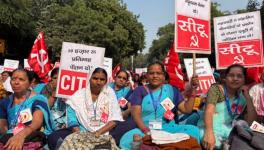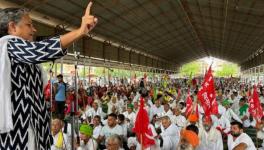TU Amendment Bill: Another Bid by Modi to Cripple Trade Unions
File Photo : Central TUs Boycott Labour Ministry Meet for Third Time
Even as ten central trade unions (CTUs) have called for a nationwide workers’ strike on January 8-9, expected to be among the biggest strike actions in India, the Narendra Modi government continues to relentlessly attack workers’ rights, including the right to fight for these rights.
Trade unions have vehemently opposed the Modi government’s move to scuttle the democratic process for recognition of the CTUs — by way of theTrade Unions (Amendment) Bill 2018, which was approved by the Union Cabinet on January 2, 2019.
Meant to amend the Trade Unions Act 1926, the Bill proposes to grant statutory recognition to trade unions at both the central and state-level.
However, unions have pointed out that the Bill seeks to vest the government with the discretionary power in recognising the trade unions, departing entirely from the existing practice based on tripartite (employees, employers and government) consensus.
And while stating that the Centre and state governments would need to provide statutory recognition to unions, the Bill does not mention the procedure or eligibility criteria or any other detail as to how the trade unions would be recognised.
The Bill is also silent on the issue of mandatory recognition of trade unions at the enterprise/establishment level — a long-standing demand of the unions.
Recognition by employers is especially crucial because CTUs are confederations of workplace/enterprise-level registered trade unions that have a presence in at least four states with a minimum membership that is revised periodically (to be jointly decided by the CTUs and the Ministry ofLabour & Employment). These unions then represent the workers’ interests in various tripartite or bipartite forums in India and abroad, and wield the power of collective bargaining at the central level.
What’s more, the issue of employers not recognising trade unions at the enterprise level is so rampant that it has led to unrest and victimisation of workers across the country, particularly in the private sector. Workers have been punished for forming or participating in trade unions, for example, at the Maruti-Suzuki plant at Manesar in Haryana, at the Pricol and Yamaha factories in Tamil Nadu, etc. Struggles by workers for recognition of trade unions are being waged in most states, including Maharashtra, Rajasthan, Karnataka, etc.
On August 10, 2018, ten CTUs had written to the Labour Ministry, stating that the proposed amendment was not “acceptable” to them. The unions even sent their observations and suggestions on the proposed Bill. The letter urged the government to redraft the proposed Bill based on these inputs, and to then hold a discussion with all the CTUs.
As usual, the RSS-backed Bharatiya Mazdoor Sangh (BMS) did not support the other unions in their demands.
“We also urge upon you to refrain from any unilateral move on the matter unless mutually decided upon through such joint discussion,” said the letter signed by the 10 unions. The unions were the Centre of Indian Trade Unions (CITU), the Indian National Trade Union Congress (INTUC), All India Trade Union Congress (AITUC), Hind Mazdoor Sabha (HMS), All India United Trade Union Centre (AIUTUC), Trade Union Coordination Centre (TUCC), Self-Employed Women’s Association (SEWA), All India Central Council of Trade Unions (AICCTU), Labour Progressive Federation (LPF), and United Trade Union Congress (UTUC).
The demands/observations/suggestions of the unions included that recognition of trade unions at the enterprise-level by the employer concerned be made mandatory.
“Recognition should be decided through Secret Ballot by laying down a detailed procedure jointly by the Govt. and the Central Trade Unions. TheUnion getting more than 50% votes may be recognized as the major union and the union getting 35% and more may be treated as the second largestrecognized union.”
“However, if none of the unions is getting 50% Membership, then the representation in the collective bargaining forum or joint representative forum should be on the basis of proportionate representation in terms of the membership/votes secured by the contending unions. The recognition granted should be for a period of 5 years. Verification of membership through secret ballot should be completed 2 months before the completionof the 5 years period for future recognition.”
They also demanded legal protection to workers “who take the initiative to form a Trade Union from any punitive action from the employer, victimization etc.”
The amendment does not include the definition of and eligibility for being considered a CTU as unanimously formulated in meetings with the Labour Ministry.
The unions demanded that this mutually decided upon definition and eligibility criteria be included in the text of the proposed Bill rather than being kept aside for the ‘Rules’ that are to be “prescribed” later.
Among other issues that the letter raised, are related to workers in the unorganised sector, “where employer-employee relationship is either denied or is of atypical form” — such as bidi workers, domestic workers, migrant workers, agricultural workers, contract workers, etc. These workers are unionised, but there is no mechanism to recognie any one union out of several contending unions working among them, the letter said. “The Act would have to lay down procedure for inclusion of such workers in the process.”
On January 3, 2019, the Centre of Indian Trade Unions (CITU), in press release, denounced the BJP-led NDA government’s unilateral move to “usurp the wide discretionary power” in recognising unions — “in total departure from existing mutually agreed practices being followed for last couple of decades, based on which verification of membership of central trade unions have been conducted number of times during last three decades.”
All this is being done in the name of introducing “transparency” and avoiding “duplicacy of such exercise by different departments”, as the government’s press briefing stated.
The CITU said the government’s “dubious intent” had already been exposed in the way it “has arbitrarily debarred the biggest central trade union in the country, Indian National Trade Union Congress (INTUC), from representation in the tripartite committees including the Indian Labour Conference. All the ten central trade unions in the country opposed such proposal of the government.”
Speaking to Newsclick, CITU general secretary Tapan Sen said, “This government’s main purpose is to change the existing arrangement of recognising the trade unions and selecting the CTUs.”
“The Government of India has many tripartite bodies, and these bodies have the provision for representation of workers. Government conducts verification of the existing central trade unions, and accordingly allows representation to them in proportion to their respective strength.”
“Basically, this government wants to put in place its own rules, codified in law, so as to decide which trade union organisations can be approached for these representations,” he said.
“In lieu of this existing process, the government wants to have the discretionary power with them,” he said.
Sen underlined the fact that this amendment was part of the Modi government’s clear ‘Labour Law Reforms’ — including the four code Bills to replace the existing 44 labour laws — which are a bunch of clearly anti-worker and pro-employer legislations designed to impose conditions of slavery upon the working classes and to abrogate trade union rights.
“They want to cripple the trade unions, assuming the power themselves and invalidating the existing democratic processes,” Sen said, adding that “We shall continue to fight this amendment tooth and nail, just as we are fighting all anti-labour legislations and other moves.”
Get the latest reports & analysis with people's perspective on Protests, movements & deep analytical videos, discussions of the current affairs in your Telegram app. Subscribe to NewsClick's Telegram channel & get Real-Time updates on stories, as they get published on our website.
























